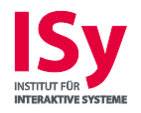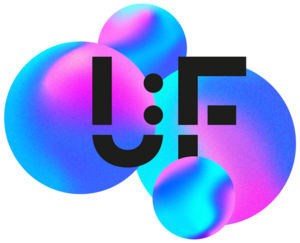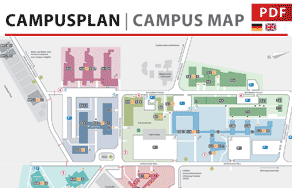Who are you, what kind of conference was it?
I am Anja Lorenz and I have been working at ISy for a while now. The University:Future Festival (UFF) is organised by the Hochschulforum Digitalisierung (HFD) and, by their own claims, it is the largest event on digital futures in higher education - and I do believe that. It is a "festival" and therefore primarily focussed on sharing new insights. Unlike other academic conferences, the idea is to learn from experience and have some fun at the same time. It's also a special opportunity to experiment with new formats and initiate discussions.
The event was "online first", which allowed me to comfortably participate from Lübeck. There were also partner stages where special talks were invited. We were very pleased that one of our contributions was also presented on stage in Berlin, which Andreas Wittke presented there in person.
How did you contribute to the event?
The slogan for this year's festival was "Tales of Tomorrow". We from ISy had prepared some contributions with several colleagues and project partners, and we subsequently distributed the presentations among some of us.
Together with Ronny Röwert, I myself gave an input on the Digital Learning Campus (DLC) (Slides can be found here). We recently received the funding for this project. As for every project, we now have many goals and ideas that we want to achieve at the start. For our contribution, however, we changed our perspective and considered what could make the project fail. The result was a somewhat bizarre presentation, but the preparation also helped us a lot to recognise potential potential problems in advance.
In addition, I was invited to a live podcast recording of "Update Hochschule". The episode can be listened to here. It was about the topic "Hypes of Tomorrow". Together with Markus Deimann and the hosts Franz Vergöhl and Ronny Röwert, we reflected on the hypes of the past few years.
What did you learn from the event?
The UFF had a very wide-ranging programme, and I focused on presentations on artificial intelligence (AI), future skills and open educational resources (OER). The contributions and talks were full of exciting ideas, and I plan to watch some of the recordings. I wish that the projects presented could also have an impact on universities. However, resistance is often encountered here, so that the projects are more like lighthouses than broadly effective.
The festival's online platform was also good and made it much easier to switch between sessions virtually. Nevertheless, the personal meetings with people still felt a little lacking, even though there were extra rooms on the platform for the exchange of ideas. Unfortunately, I didn't use them after all.
Please give us one highlight from the event
A special highlight of the event for me was a session organised by Magdalena Spaude and colleagues from the stage in NRW. Our task here was to use generative AI tools to rewrite the text of the fairy tale "Die Sterntaler" (The Star Money) to include OER topics. It was possible to consider various additional conditions. The collected results were very funny and I took the opportunity to generate a song. I'm sure the concept can be reused to introduce people to AI tools.





